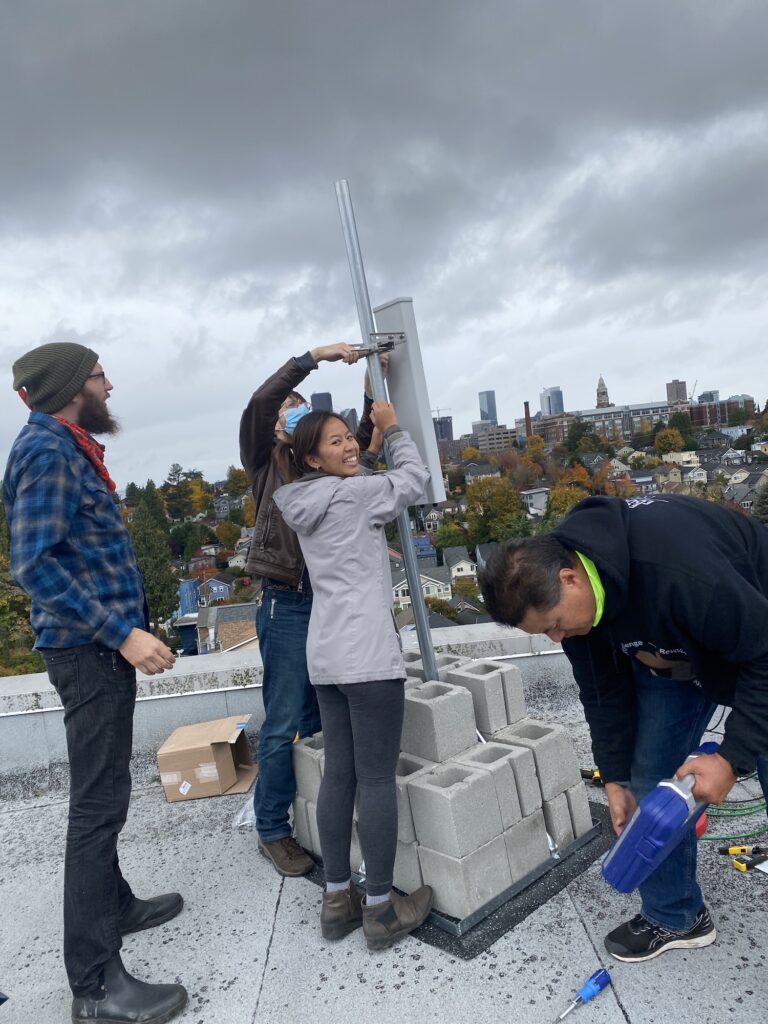Two years of conducting business, school, and socialization online during the COVID pandemic exposed the extent to which unequal access and inadequate connectivity is a barrier for people in both rural and urban communities. For a team led by Allen School professor Kurtis Heimerl, closing the gap in access to internet connectivity had been the focus of earlier research in far-off locales. With the pandemic highlighting connectivity challenges closer to home, the researchers turned their focus to what they could do to help the estimated 5% of the population that remains unconnected in Seattle and neighboring communities in the Puget Sound region.
The team — which includes Ph.D. students Esther Jang and Matthew Johnson and postdoc Spencer Sevilla — aims to address the problem by supporting the creation and expansion of community networks (CNs). CNs are community-built and managed infrastructure that offer tailored access to that community. While CNs have been successfully deployed on a small scale, large-scale adoption is impeded by both technical and non-technical issues that include the cost of technology, limited unlicensed spectrum, and difficulty scaling with non-technical partners. The team’s approach was twofold: first, they needed to implement the required technological infrastructure and second, they required community partners to make the goal of increased connectivity a reality.
Their efforts were recently recognized as the Best Overall Winner in the Proof of Concept Category in the 2022 IEEE Connecting the Unconnected Challenge, a global competition that aims to identify research projects that bridge the digital divide in innovative ways and offer technological solutions to improve connectivity for unconnected and under-connected people to facilitate the expansion of online marketplaces and provide opportunities to engage with increasingly online services for health, education and economic progress. The Allen School-led project, “Scaling the Seattle Community Network with dAuth and the Teaching Network,” introduces an innovative approach to core network design and highlights the establishment of seven functional CN stations in Seattle, Tacoma and other local municipalities. Likewise, this project showcases the success of building community partnerships through research and a Digital Stewards Trainee Program to extend internet connectivity to people who are marginalized and who live in low-income areas.
The new core network design utilizes an open source, community-based federated trust model that allows for seamless scaling of the network with incremental trust between partner organizations. This facilitates authentication and authorization for granting access on a serving network. In this way networks do not need to have preexisting relationships. A wide range of off-the-shelf devices without modification can be supported under this design.
The network is designed to tolerate temporary failure of one of the partner organization’s networks without the overall system losing functionality, as well as the means to operate with the presence of malicious nodes that exist outside of the user’s home network without affecting the user’s security. The team built the system with existing hardware created for standardized 4G and 5G networks that does not require a system-specific upgrade from the manufacturer.
To date, Heimerl’s team has successfully deployed CN stations at the Seattle Filipino Community Center, the main branch of Tacoma Public Libraries, Garfield High School in Seattle’s Central District, Franklin High School in Seattle’s Mount Baker neighborhood, the Oromo Cultural Center in Seattle’s Rainier Beach neighborhood, the Skyway Library and SURGETacoma. Related to this, the team has engaged with their partner community organizations through digital stewardship, vocational training and digital literacy curriculum development.
“Our theory of change revolves around the coupling of core technical advances that place power and control in the hands of community members with capacity building to bolster communities’ ability to manage and maintain those technologies,” explained Heimerl. “We believe this holistic vision will dramatically reshape the local telecommunications ecosystem and produce sustainable innovations that impact both industry and communities where people have lacked adequate internet access.”
The initial stages of this work culminated in the founding of the non-profit Local Connectivity Lab, which would form the basis for the Seattle Community Network and would deploy the necessary LTE infrastructure to make the project come to fruition. The lab has entered into multiple partnerships in the communities it serves, including but not limited to Seattle Community College, Seattle Public Libraries, Seattle Public Schools, Tacoma Public Library, Tacoma Cooperative Network, Black Brilliance Research Project, Althea and the Filipino Community of Seattle.
Read previous coverage of this work by the Allen School, the UW Information School, and GeekWire.


